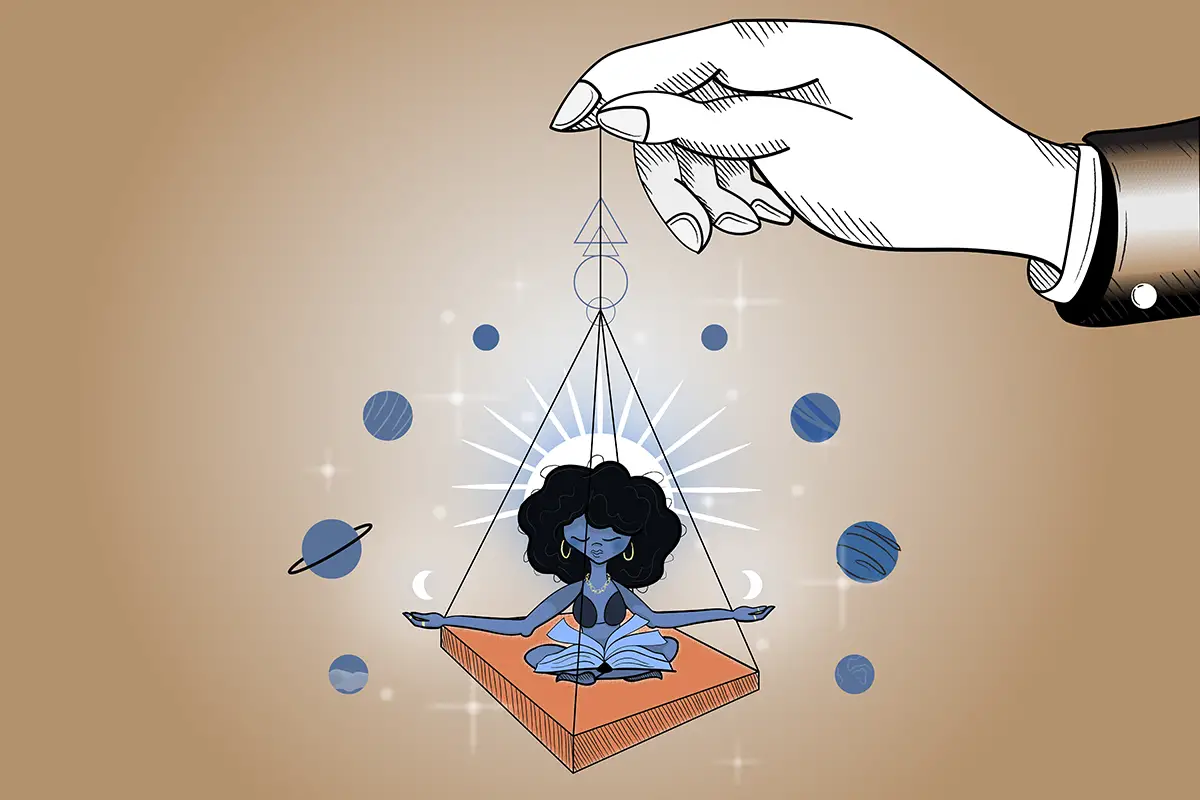Astrology. We all know it. We all have strong feelings about it. Whether you check your horoscope daily or condemn the practice as meaningless witchcraft, it cannot be denied that astrology has become a very large part of American pop culture. After having seemingly dropped in prevalence following the practical death of teen magazines like “Tiger Beat” and “Seventeen” in the early 2010s, astrology has made a resurgence with apps like Co-Star.
However, even with its recent spike in popularity, astrology is still not taken seriously in academic spheres, leading one to wonder why. Could it be because astrology has long been pioneered and practiced by women?
For years, the main practitioners of astrology have been women and femme people. It has been a mode of communication and spiritual bond for them, as well as a form of knowledge that they could call all their own. This is quite apparent in the way horoscopes were marketed towards teenage girls in aforementioned gossip and culture magazines.
And yet, it is the way astrology has been portrayed in said magazines that has contributed to its dismissal in the academic world. Astrology is perceived as being “too feminine” and immature or girly to be taken seriously as a real scientific method or religious practice.
In her paper on Negar Mottahedeh’s “Whisper Tapes: Kate Millet in Iran,” scholar Ari Tolany discusses how “[m]odes of spirituality and knowledge [like astrology] which do not fit into profit-driven and patriarchal structures have long been dismissed both by the male-dominated academy and male-dominated religious hierarchies.”
She talks about how women in both the United States and Iran around the time of second wave feminism would have “dabbled in herbalism, earth magic, astrology and other ‘feminine’ arts.” These arts then served as a link between the two, even if it was dismissed by the male religious, academic and political leadership of both countries.
The resurgence we have seen among many millennials and Generation Zers has also been spearheaded by femme people. Some of the apps that have characterized this era of astrology have even been founded and run by women.
Co-Star was founded by two women and a man: Banu Guler (who continues to serve as CEO), Anna Kopp and Ben Weitzman. The app takes the time and place you were born to create a “birth chart” that tells you all sorts of things about you, from your signs to your houses to … well, you get the picture.
With this information, the app sends you updates about what parts of your personality are especially strong that day and what you should work on. It’s a very useful tool. But it’s receiving the same passive — sometimes even mocking — reception that past iterations of astrology, like the teen mags, did. It is very unfortunate that astrology is so held back by these sexist views, because it has a very unique ability to connect people (femme or otherwise) so specifically.
Astrology even has the ability to cross age barriers among femme people. The best example of this is Latino astrologer Walter Mercado. The iconic television personality sadly passed away at the age of 87 on Nov. 3. However, he received an outpouring of love and praise following his death. People from all around sent out their gratitude on social media and applauded the way Mercado had become a staple in many Latinx households.
His warm personality and unapologetically gender-nonconforming presentation invited an estimated 120 million viewers to his astrology readings every single day. Fans noted his bold, amazing ability to show his feminine side and still attract the adoration of many people of older generations, especially women.
In fact, in an interview with Remezcla, he stated that it was because he felt so free to be his authentic self during his readings that he was able to be “so connected to people and to the divine.”
Despite the connection Mercado talks about and the beautiful ways in which astrology is able to break down barriers, there are still many people (usually men) in academic and religious circles that say astrology has no scientific merit or that it is sacrilegious nonsense. They believe it is like a false medium or fortune teller, spitting out lies for profit or Satan’s will.
In reality, this is far from the truth. The practice has roots going back thousands of years, and has nothing to do with witchcraft. It was once highly respected and sometimes even considered scientific fact, but that was during a time when it was dominated by men. Now that women have the reins, astrology is mostly considered just a bunch of hocus-pocus, hippie garbage. But it has nothing to do with “vibes” or “waves” or anything like that.
Astrology is meant to be a helpful guide to living your life. It is not a full blown religion and it is not hard science either. But there is some merit to it. After all, the moon, planets and other space objects do use forces like gravity to affect the tides and weather. Who’s to say there isn’t more that’s being affected?
Many people have begun practicing astrology alongside their own religion, believing it to be just another force controlled by a higher power, like signs from God. Other people have explored the academic side, relating how actually measurable forces from planets and such can affect our moods, relationships and more through the way we interact with the things that these forces are applied to. These forces create scenarios with predictable outcomes that can be put into the form of horoscopes and the like.
Unfortunately though, the sexist stigma surrounding astrology has kept these efforts from the limelight. Most scientists and other religious scholars would laugh if asked about the accuracy of astrology.
One can only hope that as times change and ideas from femme people gain more recognition, astrology will return to the respected position it once held in the academic world. Perhaps the rise of Co-Star and the attention given to efforts made by people like Mercado will help spur this on. I guess we’ll just have to wait and see.
















